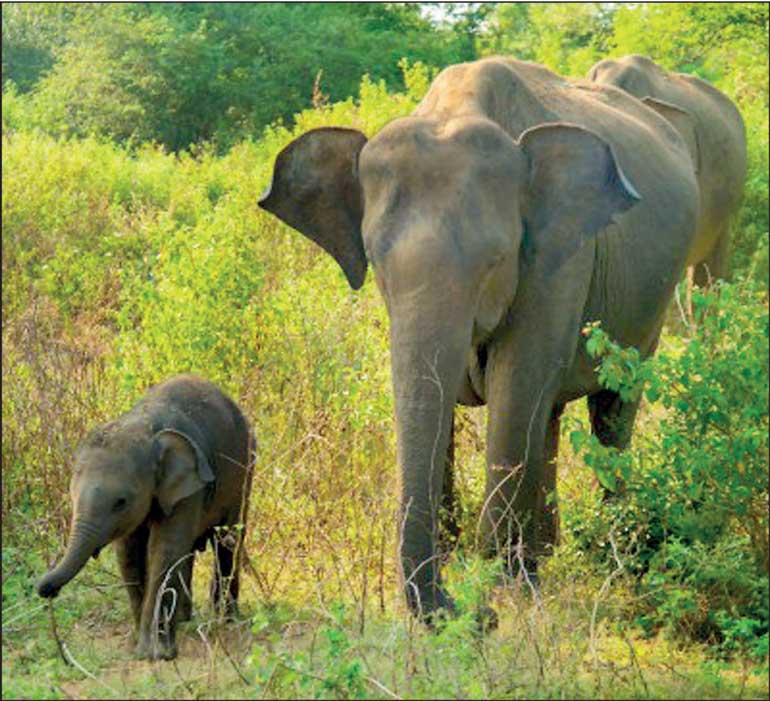Wednesday Feb 18, 2026
Wednesday Feb 18, 2026
Saturday, 23 March 2024 00:00 - - {{hitsCtrl.values.hits}}

 Elephants are an inspiring species, almost more human than humans; their social structure and bonds of family are admirable. In 2009 we inaugurated the Elephant Information Centre at the Elephant Transit Home in Uda Walawe. It was the first time Sri Lanka’s Department of Wildlife Conservation was able to engage visitors with the story of elephants. Last Saturday, it was thrilling – 15 years later – to do as my son Amrit and I in 2009, building on the success of the unique facility with the renewed Dilmah Conservation ‘Elephant Knowledge Walk’.
Elephants are an inspiring species, almost more human than humans; their social structure and bonds of family are admirable. In 2009 we inaugurated the Elephant Information Centre at the Elephant Transit Home in Uda Walawe. It was the first time Sri Lanka’s Department of Wildlife Conservation was able to engage visitors with the story of elephants. Last Saturday, it was thrilling – 15 years later – to do as my son Amrit and I in 2009, building on the success of the unique facility with the renewed Dilmah Conservation ‘Elephant Knowledge Walk’.
The question hung in the 40 degree heat, as renowned Elephant Conservationist Dr. Sumith Pilapitiya explained the significance of elephants, why a tea company should invest in a long-term partnership for the conservation of Sri Lankan elephants in isolated Uda Walawe.
Elephants are a beautiful species, and Sri Lankan elephants native to our island are one of three sub-species of the Asian Elephant; they are amongst the most empathetic species, with strong social bonds. They are ecosystem engineers, their behaviour supporting the forest ecosystems, pollination and biodiversity.
What is an elephant worth?
The value of elephants is beyond doubt. When we first conceived the idea of an elephant information centre, we did so to attempt to explain that value and engage the thousands who visited the facility to see the remarkable sight of baby elephants being fed milk three times daily. At the inauguration last weekend of the Elephant Knowledge Walk, I explained the value of elephants, quoting the most recent research I could find, as $ 1.6 million based on their value for ecosystem services and tourism. In his later keynote address Dr. Pilapitiya corrected me, adding $ 2 million in cultural, religious and other value.
While subconsciously we value Nature enormously, our myopic economic system cannot comprehend the value of clean air, the positive effects of forest therapy in supporting heart health, mental health and boosting immunity. Nature – of which elephants, forests, bees, kingfishers, eagles, fish, clean rivers, oceans and more are a critical and necessary part – offers us a range of services which are a prerequisite for life on earth. Ecosystem services include flood control, carbon sequestration, biodiversity, and have dramatic effects on food security, human health, climate resilience, yet a 2021 study estimated that only 3% of the terrestrial surface of the world was not degraded by human activity.
A UN report estimates that $6-$10 trillion worth of ecosystem services are forfeited annually due to land degradation. The cost is manifest in unsustainable migration, desertification, poverty, starvation. The irony is that effectively addressing that situation could add $ 75 trillion to the world economy for a fraction of that cost.
We value Nature, and respect her role and importance for the well-being of unborn, future generations. That means our actions today determine the quality of life for our children and these future generations.
As a family tea company we have an enduring connection with Nature, because the Teamaker’s task is to decipher Nature, understanding the natural factors that contribute to aroma, taste, flavour and texture in our teas. We value Nature, and respect her role and importance for the well-being of unborn, future generations. That means our actions today determine the quality of life for our children and these future generations. That’s the link between the Elephant Knowledge Walk and Tea Inspiration because awareness of the value of our natural environment is a precursor to action, and we must all act. Now.
Note: In our upcoming editions the Harmony page will publish exclusive coverages of the Elephant Knowledge Walk in how it brings joy to the lives of humans and elephants.